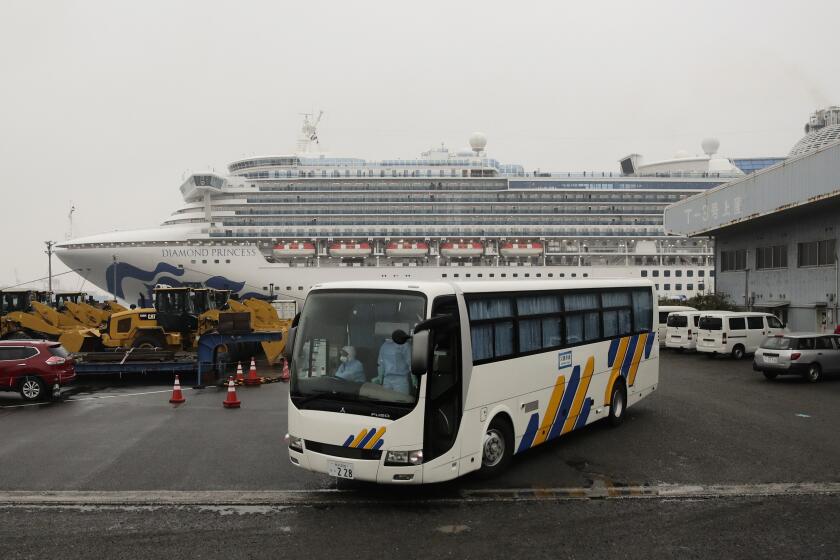Amid coronavirus threat, study abroad programs in China canceled
Last summer, Andie Yu arrived in Beijing for a yearlong program at Peking University. The UC Irvine computer science student from Las Vegas was eager to improve her Mandarin and gain experience to be a more competitive job candidate in China.
But her program was cut short after the University of California suspended all non-essential travel to China, including study abroad programs, in response to the fast-spreading coronavirus.
Now Yu, 23, an American citizen, is stuck in Xiamen, China, where she has relatives. She booked a flight to Los Angeles but is unsure when she’ll make it home to her parents in Las Vegas — and expects she’ll be quarantined.
Yu is among hundreds of college students nationwide whose study plans have been upended by intensifying response to the virus. Students and university officials alike are scrambling to secure visas and flights back to the U.S., reenroll in coursework so as not to lose out on an entire semester, or find alternate study abroad programs, typically a highlight of students’ college experience.
“Study abroad is for most students challenging to schedule into their degree advancement at all. So if it doesn’t work in the planned semester, it’s unlikely it’s going to work in some other semester,” said Caroline Maas, senior vice president for study global operations at the Council on International Educational Exchange. “For these individual students who have been planning to study abroad, in some cases for years, it’s pretty tragic.”
The blow to these academic exchanges between the U.S. and China is one of the myriad ways in which the virus, officially named COVID-19, has disrupted lives around the world. As of Sunday, there had been more than 71,300 confirmed cases and 1,775 deaths from the virus worldwide.
The deadly coronavirus outbreak is hurting scores of companies in California and nationwide that depend on Chinese production and consumer spending.
CIEE, which describes itself as the largest study abroad provider in the U.S., has canceled both its spring and summer offerings in China. The move affected students across the country, including several each at Occidental College, Syracuse University, the University of Colorado at Boulder and the University of Miami.
When the late January cancellations hit, most students’ home institutions had already begun classes. Just a handful of CIEE programs, including “Berlin Business and Culture” and “Perth Arts and Sciences,” remained open for enrollment. Students were given the option of switching to those programs for the same or lower cost or receiving a refund for their China studies.
But some students were advanced Chinese speakers seeking language immersion.
“An English-language program taught in Europe and focusing on business and communications and history clearly wasn’t going to work,” Maas said. So CIEE created new Chinese-intensive programs in Taiwan and London and moved many students there instead.
Yu was one of about 50 spring participants in China programs administered directly through UC. A native of Fujian province, she grew up primarily speaking a local dialect. She immigrated to the U.S. after elementary school. Spending a year in Beijing, she hoped, would help her become fluent in Mandarin and teach her about Chinese society.
China may postpone its biggest political meeting of the year, as the military dispatches hundreds more medical workers and extra supplies to the city hit hardest by a 2-month-old virus outbreak.
Yu was visiting relatives in Gutian when she got the news that her program was suspended.
“All my plans got messed up,” she said.
At first, she asked to continue her studies since she was already in China. But, Yu said, she was told the program was suspended, in accordance with UC policy for countries under serious travel advisories.
With UC Irvine’s winter quarter already well underway, returning to classes on campus wasn’t an option. Yu was offered the chance to apply to Korea University but took too long to make up her mind, she said.
Even trying to collect her belongings and return to Las Vegas has been an ordeal. As she traveled last week from Gutian to Xiamen, she walked a quarter of a mile down a highway to cross a checkpoint, where officials took her temperature, she said. She can’t go back to Beijing to get her things from the Peking University dorm, so she’s asked a teacher there to ship them to relatives. She had to cancel a flight home, paying a $300 penalty, because passengers from China can no longer arrive directly in Las Vegas.
U.S. officials said early Monday that 14 American passengers evacuated from the Diamond Princess cruise ship in Japan had tested positive for the new coronavirus, but were allowed on flights to military bases in California and Texas.
At USC, where study abroad in China is a part of many business students’ education, officials have been “working like crazy” to respond to the effects of the coronavirus, said Tyrone Callahan, vice dean for undergraduate programs at the Marshall School of Business.
A popular leadership course for about 80 freshmen, for example, educates students on Chinese history and the economy and then sends them on a weeklong trip to Beijing and Shanghai over spring break.
“We spend a lot of time telling them how amazing it is to be able to go and see what’s happening in China … so when we had to pull back from that they were obviously disappointed,” Callahan said.
Those students will instead split the week between Havana and Mexico City.
In New York, about 250 students from NYU’s Shanghai campus were relocated to its flagship in Manhattan. About 80 moved to other NYU sites around the world, while some 600 more — mostly Chinese nationals who didn’t have or couldn’t quickly get a visa to study elsewhere — remain in China, where they may continue the semester through distance learning online, said NYU Associate Vice Chancellor Josh Taylor.
A group of Americans are cutting short a 14-day quarantine on the Diamond Princess cruise ship in the port of Yokohama, near Tokyo, to be whisked back to America.
Alexandra Kogler of Atherton, Calif., and Brandon Shi of Chino Hills began their freshman year at NYU Shanghai last fall. The two 19-year-old students are now enrolled on campus in New York.
“It feels overwhelming to adjust to a new campus right away. It’s a huge change in terms of the city and the student body size,” said Kogler, who has yet to declare a major. She said her new professors have given her time to catch up with coursework.
Shi, an interactive media arts and business major, is worried about his expenses. Although the university didn’t charge him more for housing in New York, he expects to pay a lot more for food.
But mostly he’s excited.
“I think this was honestly the best solution to a tragic incident,” he said.
More to Read
Start your day right
Sign up for Essential California for news, features and recommendations from the L.A. Times and beyond in your inbox six days a week.
You may occasionally receive promotional content from the Los Angeles Times.











